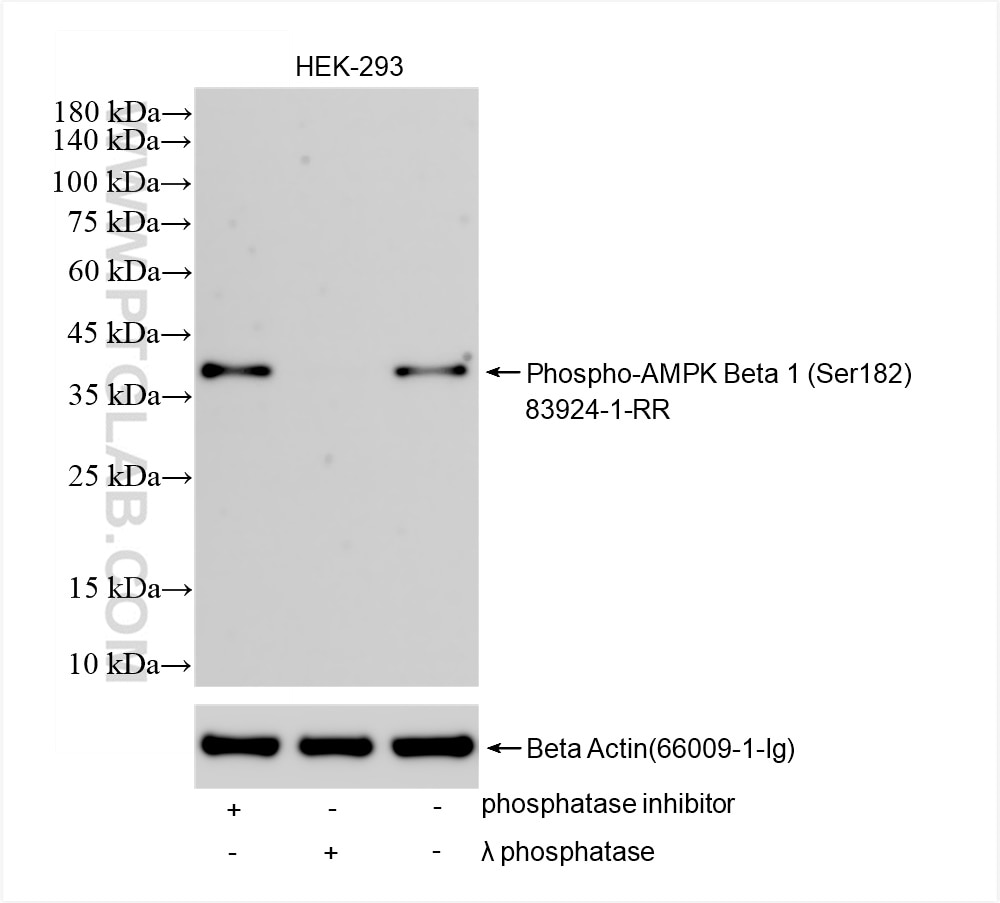Tested Applications
| Positive WB detected in | HEK-293 cells, λ phosphatase treated HEK-293 cells |
Recommended dilution
| Application | Dilution |
|---|---|
| Western Blot (WB) | WB : 1:500-1:1000 |
| It is recommended that this reagent should be titrated in each testing system to obtain optimal results. | |
| Sample-dependent, Check data in validation data gallery. | |
Published Applications
| WB | See 14 publications below |
Product Information
83924-1-RR targets Phospho-AMPK Beta 1 (Ser182) in WB, ELISA applications and shows reactivity with human samples.
| Tested Reactivity | human |
| Cited Reactivity | human, mouse, rat, pig |
| Host / Isotype | Rabbit / IgG |
| Class | Recombinant |
| Type | Antibody |
| Immunogen |
Peptide Predict reactive species |
| Full Name | protein kinase, AMP-activated, beta 1 non-catalytic subunit |
| Calculated Molecular Weight | 38 kDa |
| Observed Molecular Weight | 38 kDa |
| GenBank Accession Number | BC001007 |
| Gene Symbol | PRKAB1 |
| Gene ID (NCBI) | 5564 |
| RRID | AB_3671504 |
| Conjugate | Unconjugated |
| Form | Liquid |
| Purification Method | Protein A purfication |
| UNIPROT ID | Q9Y478 |
| Storage Buffer | PBS with 0.02% sodium azide and 50% glycerol, pH 7.3. |
| Storage Conditions | Store at -20°C. Stable for one year after shipment. Aliquoting is unnecessary for -20oC storage. 20ul sizes contain 0.1% BSA. |
Background Information
AMPK Beta 1 (5'-AMP-activated protein kinase subunit beta-1) is also named as PRKAB1 and AMPK. AMPK, a serine/threonine kinase that exists as a heterotrimer comprised of a catalytic α-subunit and regulatory β- and γ-subunits, has been recognized as a sensor of cellular energy homeostasis (PMID: 21937710). AMPK regulates key metabolic enzymes, cell growth, apoptosis, gene transcription, and protein synthesis (PMID: 12829246). AMPK is an energy sensor and plays an essential role in the control of cellular bioenergetics by responding to various stresses including those that induce changes in the cellular AMP:ATP ratio or modulation in intracellular calcium (PMID: 27812976, PMID: 26616193). Recent studies have shown that AMPK mediates the inhibition of cell proliferation and growth of tumor cells (PMID: 16613876). AMPK also inhibits the expression of Glut1 and glycolysis in Tregs by inhibiting mTORC1 signaling (PMID: 25477880). This antibody recognizes phosphorylated AMPK Beta 1.
Protocols
| Product Specific Protocols | |
|---|---|
| WB protocol for Phospho-AMPK Beta 1 (Ser182) antibody 83924-1-RR | Download protocol |
| Standard Protocols | |
|---|---|
| Click here to view our Standard Protocols |
Publications
| Species | Application | Title |
|---|---|---|
Front Nutr Luteolin attenuates LPS-induced damage in IPEC-J2 cells by enhancing mitophagy via AMPK signaling pathway activation | ||
Anal Cell Pathol (Amst) Shikonin Induces Autophagy and Apoptosis in Esophageal Cancer EC9706 Cells by Regulating the AMPK/mTOR/ULK Axis | ||
Sci Adv Bioenergetic-active exosomes for cartilage regeneration and homeostasis maintenance | ||
Cell Signal Targeted therapy for KIF3C: A study on the mechanism of combined therapy with KIF3C signaling pathway, afatinib, and MT-DC (ac)phosphoramide in regulating gastric cancer cell proliferation | ||
J Ethnopharmacol Flavonoid-rich extracts of Nelumbo nucifera leaves alleviate obesity in HFD-fed mice via microbiota-dependent modulation of brown fat thermogenesis | ||
J Sci Food Agric Hawthorn total flavonoids ameliorate hyperlipidemia through AMPK/SREBP1-c and PPARα/PGC-1α/CPT-1A pathway activation and gut microbiota modulation |




